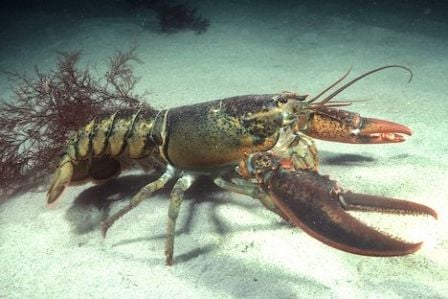Since Red Lobster’s Super-Pinched, Why Not Give Vegan Seafood a Shot?
Following news that Red Lobster has filed for bankruptcy and closed dozens of restaurants, PETA sent the chain’s CEO, Jonathan Tibus, delicious, flaky crab-free crab cakes as well as a nip of whiskey and a note encouraging him to take a shot, then give vegan seafood a shot.

Hey, Red Lobster, Try Banking on Kindness
PETA celebrates the closure of many of Red Lobster locations, a sign that today’s diners are buying more vegan seafood and less sea life. But despite its financial floundering, the chain is leaving nearly 600 of its restaurants afloat while attempting to restructure.
How might large restaurant chains like Red Lobster prove that they’re not morally bankrupt? They could consider how using other animals for food is a leading cause of poor human health and the climate catastrophe, to start. PETA has another solid pinch of advice to offer when it comes to consideration for other species:
This is Red Lobster’s chance to stop treating other species like products instead of living, feeling animals—which the ocean will be empty of by 2048 if humans keep killing sea life.
Red Lobster cites its choice to permanently place “endless shrimp” on its menu in mid-2023 as the primary reason for going bankrupt. Rather than seeking the source of sinking finances, PETA urges Red Lobster—and everyone—to consider this: Bottomless shrimp? The number of animals in the ocean isn’t “bottomless.”
“Red Lobster’s day of reckoning for selling the flesh of sea animals who were abducted from their ocean homes or packed into filthy farms is here. PETA urges the chain to acknowledge the turning of the tide and embrace a vegan rebrand—for everyone’s sake.”
—PETA Executive Vice President Tracy Reiman

And vegan seafood is booming. The global plant-based seafood market size was valued at $42.1 million in 2021 and is projected to reach $1.3 billion by 2031.
What Sea Life on Red Lobster’s Menu Endures
Crabs and lobsters are curious, social, sensitive beings, yet they’re often thrown into pots of scalding-hot water and boiled alive. Many whip their bodies wildly and scrape the sides of the pot in a desperate attempt to escape an agonizing death.
Other aquatic animals taken from their ocean homes are impaled, crushed, suffocated, or cut open and gutted, all while they’re still conscious.
Humans farm fish on massive, crowded aquafarms, where many fish endure early deaths from parasitic infections, diseases, and injuries. Workers starve those who survive for days before they’re sent to slaughter. And trillions of fish are taken from their homes each year for food.
Every person who goes vegan saves the lives of nearly 200 animals—including aquatic ones—every year.
PETA’s free vegan starter kit helps make the switch a cinch.

It’s highly irresponsible for massive corporate chains like Red Lobster to keep serving animals as food since the production and consumption of meat, eggs, and dairy is devastating the planet and human health. Creating tasty vegan dishes is simple now, so there’s no excuse for restaurants to continue plating up cruelty and destruction.
How You Can Help
Every animal is someone—not food. And choosing vegan seafood is easier than ever. Never order a “meal” made from the corpses of sea life or any other animal. Try our free vegan starter kit, and send one to a friend while you’re at it:

